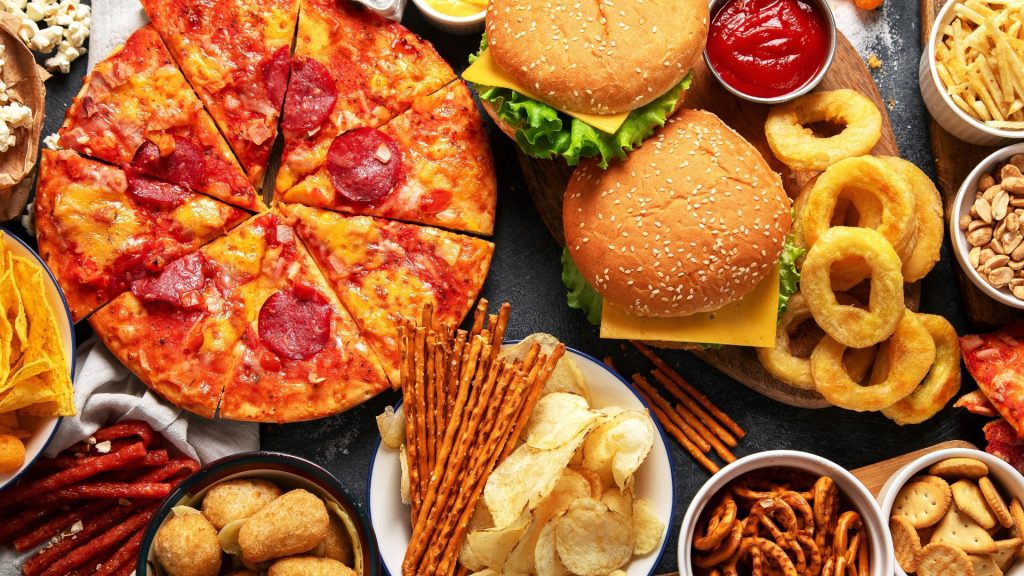Ultra-processed foods (UPFs) have quietly become central to today’s American diet. According to data available from the CDC, more than 55% of the calories Americans consume come from ultra-processed foods.
For youth, that number is even higher, around 62%. Yet behind their convenience and appeal lies a growing body of research linking these foods to serious health risks.
What Counts as “Ultra-Processed”?
The term “ultra-processed” comes from the NOVA food classification system, referring to industrial formulations made from substances extracted from foods (oils, starches, sugars), combined with additives (emulsifiers, flavorings, preservatives), and little resemblance to the original ingredients.
Unlike “processed” foods like whole-wheat bread and canned beans, ultra-processed items are engineered for hyperpalatability, long shelf life, and mass production.
Because UPFs are so ubiquitous (packaged snacks, sodas, instant meals, ready-to-eat foods), they’re hard to avoid. Some estimates suggest that nearly 70% of packaged products in the U.S. qualify as ultra-processed.
Health Effects Beyond Calories
Weight, Metabolism & Inflammation
An important randomized trial published this year showed that participants eating ultra-processed diets, even with matched calories and nutrients, gained fat mass faster than those eating minimally processed foods.
Another recent analysis links high UPF intake with elevated markers of inflammation (e.g., hs-CRP), which are predictive of cardiovascular disease.
Cardiovascular Disease, Mortality & Chronic Risk
Observational and meta-analytic evidence continues to mount. One recent international review found that each additional 100 grams per day of UPFs was tied to a 14.5% higher risk of hypertension, 5.9% greater risk of cardiovascular events, 1.2% higher cancer risk, and 2.6% increase in all-cause mortality.
A U.S. cohort + meta-analysis combining over a million participants showed that high UPF consumption is linked to an increased rate of heart disease and stroke.
Meanwhile, early mortality estimates suggest that a 10% increase in UPF energy share corresponds to roughly a 3% higher risk of dying prematurely (before age 75).
Gut Health, Additives & Microbiome Disruption
Ultra-processed foods are known to be low in fiber and contain additives such as emulsifiers, which may damage the gut microbiota and the intestinal barrier.
In one trial, a common emulsifier (carboxymethylcellulose) altered gut microbiota and reduced beneficial microbial metabolites. Over time, this can contribute to systemic inflammation, metabolic dysfunction, and impaired immunity.
Cognitive Decline & Brain Health
New evidence has also revealed that ultra-processed foods in cognitive risks.
A study of U.S. adults 55+ found that consuming processed meats and sugary drinks was associated with a 17% increase in cognitive decline; each daily serving of soda was tied to ~6% greater odds of impairment.
The authors argue that UPFs convey risk beyond classic metabolic pathways, perhaps by promoting oxidative stress or vascular damage.
Measuring UPF Intake More Accurately
One major challenge in UPF research has been reliance on self-reported dietary data, which is subject to bias. In 2025, NIH researchers introduced a poly-metabolite score (based on blood and urine metabolites) that correlates with UPF consumption.
This biomarker approach offers a more objective means of assessing the degree of ultra-processed intake and may sharpen future epidemiological studies.
How to Cut Back on Ultra-Processed Foods?
While the research is clear about the risks, experts emphasize that individuals can take practical steps to cut back on ultra-processed foods without overhauling their entire lifestyle.
- Focus on whole, minimally processed foods. Replace packaged snacks with nuts, fruit, plain yogurt, or whole grains.
- Cook from scratch whenever possible, even for simple meals, to control ingredients and reduce reliance on ultra-processed foods.
- Read ingredient lists carefully. If an item has a long list of unfamiliar names (emulsifiers, stabilizers), it’s likely ultra-processed.
- Moderate, don’t demonize. Some UPFs may be more benign (e.g., fortified cereals) and can fit into a balanced diet.
- Support policy and food system changes. The FDA has proposed creating a uniform definition of ultra-processed foods, a step that could inform labeling, regulation, and public health policy.
Ultra-processed foods offer convenience, but mounting evidence suggests their costs to metabolism, heart health, gut balance, and cognition are steep.
As biomarker research and policy efforts evolve, consumers may benefit from greater clarity and choice. In the meantime, small shifts toward whole, simple foods can add up to meaningful health gains.
Photo Credit: Ultra-Procsessed Foods (tatjanabaibakova/shutterstock)









